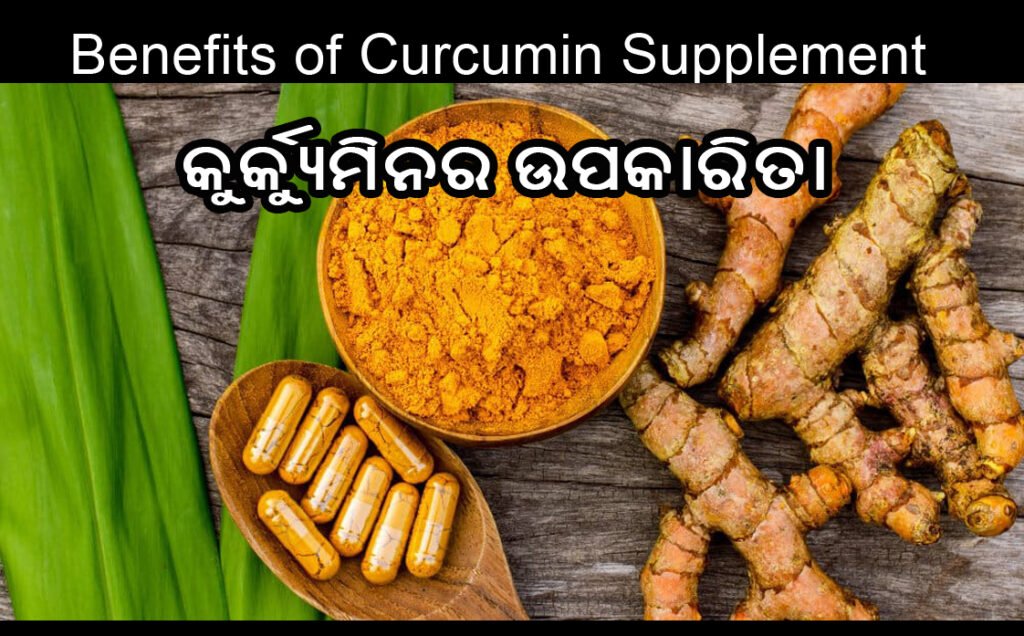Benefits Of CURCUMIN


Curcumin is the main active ingredient in turmeric. It has powerful anti-inflammatory effects and is a very strong antioxidant.
The curcumin content of turmeric is not high. It’s around 2 to 3%, by weight.
Its dosages usually 1 gram per day.
It would be very difficult to reach these levels just using the turmeric spice in your foods.
Therefore, if you want to experience the full effects, you need to take a supplement that contains significant amounts of curcumin.
Unfortunately, curcumin is poorly absorbed into the bloodstream. Black pepper which contains piperine, a natural substance that enhances the absorption of curcumin by 2,000%
The best curcumin supplements contain Piperine, substantially increasing their effectiveness of Curcumin absorption
Curcumin is also fat soluble, so it may be a good idea to take it with a fatty meal.
Curcumin is strongly anti-inflammatory. In fact, it’s so powerful that, it matches the effectiveness of some anti-inflammatory drugs, without the side effects.
It may also improve memory and make you smarter, which seem logical given its effects on BDNF levels.
Curcumin may help reverse many steps in the heart disease process.
Curcumin has been studied as a beneficial herb in cancer treatment and been found to affect cancer growth, development and spread at the molecular level.
Studies have shown that it can contribute to the death of cancerous cells and reduce angiogenesis (growth of new blood vessels in tumors) and metastasis (spread of cancer).
Curcumin May Be Useful in Preventing and Treating Alzheimer’s Disease. Unfortunately, no good treatment is available for Alzheimer’s yet.
Arthritis Patients Respond Very Well to Curcumin Supplements.
Curcumin has become very popular as an anti-aging supplement Aging and Fight Age-Related Chronic Diseases
Curcumin is the main active ingredient in turmeric. It has strong anti-inflammatory effects and is a powerful antioxidant.
Turmeric is not high in curcumin. It is about 2 to 3% by weight.
The recommended daily intake is usually 1 gram.
It is very difficult to reach this level by consuming turmeric alone in your diet.
Therefore, if you want to experience the full effects, you need to take a supplement that contains a large amount of curcumin.
Unfortunately, curcumin is not well absorbed into the bloodstream. Turmeric, which contains piperine, is a natural substance that increases the absorption of curcumin by 2,000%.
The best curcumin supplements contain piperine, which greatly enhances the absorption of curcumin.
Curcumin is also fat-soluble, so it’s a good idea to take it with a fatty meal.
Curcumin is a potent anti-inflammatory. In fact, it’s so powerful that it matches the effects of some anti-inflammatory drugs without the side effects.
Curcumin increases brain-derived neurotrophic factor and reduces the risk of brain diseases.
It may also improve memory and make you smarter,
Curcumin may have many benefits in the cardiovascular system.
Curcumin has been studied as a potential drug in cancer treatment and has been found to affect cancer growth, development, and spread at the molecular level.
Studies have shown that it may help cancer cells die and reduce angiogenesis (the growth of new blood vessels in tumors) and metastasis (the spread of cancer).
Curcumin may be useful in preventing and treating Alzheimer’s disease. Unfortunately, there is no effective treatment for Alzheimer’s yet.
Arthritis patients can benefit greatly from curcumin supplements.
Curcumin has become very popular as an anti-aging supplement and for chronic diseases related to aging or aging.
- It Lowers Inflammation: Turmeric is an excellent all-natural anti-inflammatory. It helps reduce chronic inflammation associated with arthritis and joint pain, and skin conditions such as psoriasis and eczema. It also acts as an antihistamine and reduces asthma flare-ups, and may help manage back pain.
- It’s a Potent Antioxidant: Curcumin is a common cold and flu remedy, and powerful antioxidant . Turmeric’s disease-fighting potential has shown promise as a complementary treatment for thyroid disorders, fibromyalgia symptoms, and cancer.
- It’s Good for Heart Health: – regulating blood pressure and lowering cholesterol levels.
- It Manages Weight: – improve metabolic disorders by increasing insulin sensitivity and enhancing lipid metabolism. Thus, curcumin may be useful for people with diabetes or individuals trying to lose weight.
- It Enhances Brain Function: – it can preserve brain function in those with Parkinson’s disease, Alzheimer’s or dementia . Additional research shows that turmeric can improve brain health and even reduce symptoms of depression.
- It Supports Liver Health: The liver is the body’s central filtration system and is responsible for dispelling toxins from the body. Turmeric can assist the liver in its detoxification process, helping to cleanse the body of foreign substances.
- It Improves Digestion: – Curcumin can diminish uncomfortable symptoms like bloating, abdominal pain, and constipation associated with irritable bowel syndrome (IBS) and ulcerative colitis and Crohn’s disease.
- It is Natural Anti-inflammatory compound.
- It contains Bioactive compound with powerful medicinal properties. Turmeric Dramatically increases the Antioxidant capacity of the body. Curcumin Boosts BRAIN-derived Neurotrophic factor, linked to improved Brain Function and a lower Risk of Brain Diseases.
- Curcumin should lower your Risk of heart disease. Turmeric can Help prevent (and perhaps Even treat) Cancer.
- Curcumin may be useful in preventing and treating Alzheimer’s disease. Arthritis patients Respond very well to Curcumin supplements.
- Studies show that Curcumin has incredible Benefits Against depression. Curcumin may Help Delay Aging and Fight age related chronic Diseases
- Curcumin is effective in the treatment of autoimmune diseases like lupus.
Studies have shown that short term dosages as high as 8 grams are non-toxic to humans in clinical trials. While higher dosages may be useful, we do not recommend them for long-term use. Currently, there is not have enough data available to confirm safety or tolerability of such high dosages for extended periods.
The World Health Organization (WHO) deems 1.4 mg per pound (0–3 mg/kg) of body weight to be the recommended allowable daily intake (ADI) for curcumin. This amount should be a safe and tolerable dosage for the vast majority of users looking to reduce arthritis pain, lower inflammation, or improve overall health. (3)
Popular turmeric supplements often contain a mixture of 150-250 mg of curcumin per serving, with the rest of the capsule filled with turmeric root powder. Any product within this dosing range should be acceptable for daily use.
If you are looking for an encapsulated product for health benefits, keep the following tips in mind:
- Do not buy pure turmeric root powder unless the label discloses the exact curcumin content. Otherwise, you may not be getting enough curcumin to experience the full range of benefits.
- Do not buy a turmeric supplement unless it contains some form of black pepper extract to increase absorption and bioavailability.
How long does it take for turmeric to work?
How long do you need to take turmeric before noticing results? The answer depends on the reason you’re using a curcumin supplement. For example, turmeric starts to work almost immediately after taking it for improving overall health and providing temporary pain relief.
However, if you’re dealing with chronic inflammation or arthritis and joint pain, you need to stay consistent. It may take 2-4 weeks before noticing any improvement in the arthritic condition. To achieve maximum benefits, you need to remain on a steady dosing schedule for 4-8 weeks.
The results achieved also depend on many other factors, including activity levels, age, body mass, other medications, and the severity of the condition. Turmeric works well, but it’s essential to give curcumin time to build up in your system so it can reduce systemic inflammation.
What is the best time of day to take turmeric?
The best time to take turmeric supplements varies based on the individual. Most people find success taking turmeric either in the morning to start their day, or at night before bed to combat inflammation from the day’s activities.
We also recommend that you take turmeric with a meal since curcumin absorption increases when paired with healthy fats. This will also prevent the potential for stomach irritation that you may experience by taking supplements on an empty stomach.
Precautions and Adverse Effects
The side effects of turmeric are quite rare and usually moderate. Keep the following in mind when deciding on whether or not curcumin is right for you.
- Turmeric is a blood thinner which can increase the risk of bruising or bleeding. Discontinue use of curcumin at least two weeks before any surgery or if you are using anticoagulants.
- Be extra careful if you’re using turmeric for diabetes as it may cause blood sugar to drop too low.
- Turmeric may inhibit iron absorption. If you have an iron deficiency, you may want to avoid curcumin.
- If you are pregnant or breastfeeding, you should not use turmeric. There is not enough reliable evidence to confirm the safety of curcumin during pregnancy.
- Curcumin may also increase the risk of kidney stone formation and can worsen symptomology associated with gallbladder disease.
- In a small number of individuals using higher dosages, turmeric may cause stomach pain, nausea, vomiting, diarrhea, allergic reactions, or constipation.
Difference between turmeric and curcumin







